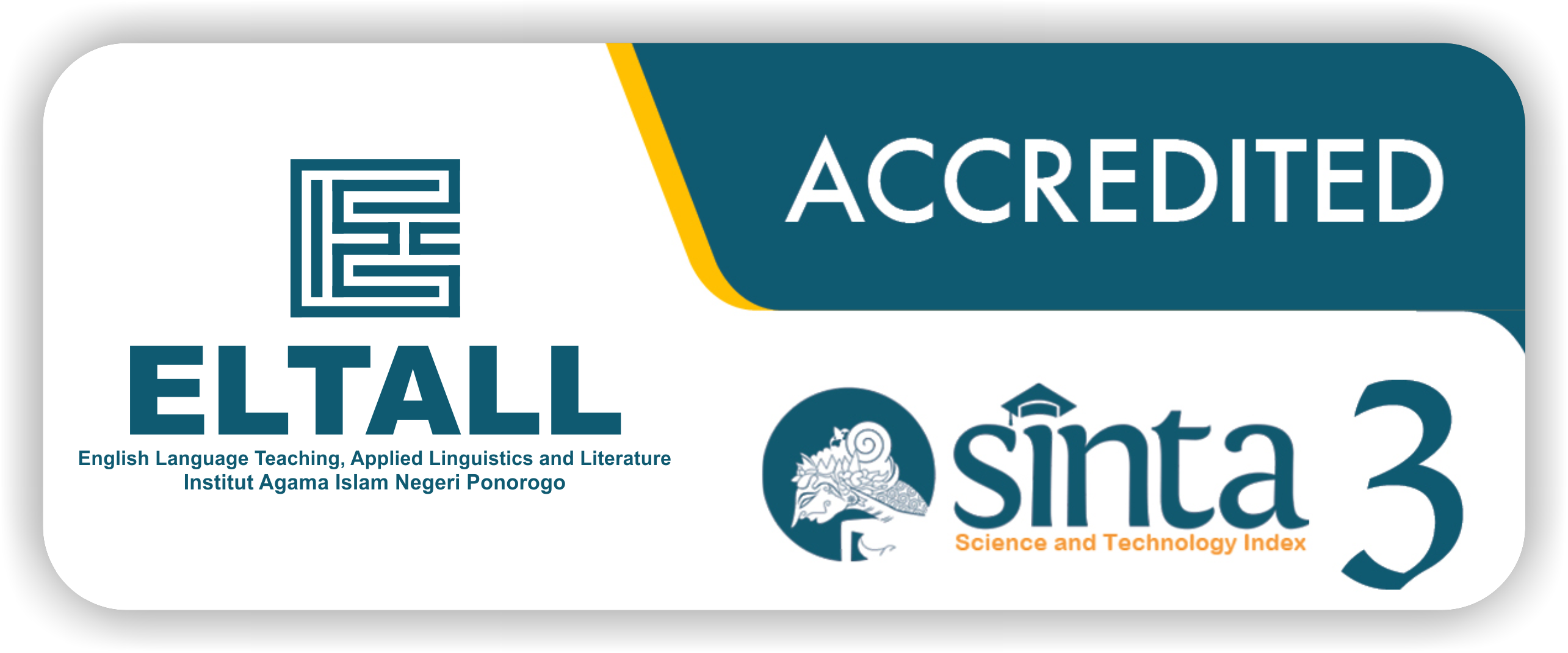The Effectiveness of Learning Together in Teaching Writing at MA Ma'arif Al-Mukarrom
DOI:
https://doi.org/10.21154/eltall.v6i1.11618Keywords:
Teaching Strategy, Learning Together, Teaching WritingAbstract
This research investigates whether there were differences in the results of students who taught using Learning Together and those who were not. Since writing is one of a language skill that difficult to master, but in fact this skill is tends to be ignored and only considered as part of grammar and syntax. Furthermore, to overview this research, quasi-experimental design was applied within XI grade students of MA Ma’arif Al-Mukarrom. To collecting the data, this study used a test and documentation. Meanwhile, the data analysis technique used normality test, homogeneity test and hypothesis test that calculated by SPSS 25. To test the hypothesis, the researcher used paired sample T-test. From the results of the paired sample t-test, a significance value of 0.000 was obtained. Therefore, the significance value is lower than 0.05 (0.000<0.05). So, it can be concluded that there are significant differences in students' writing skills between those who are taught using learning together and those who are not. Actually, LT is an effective strategy in teaching social subject lesson, by conducting this research proved that LT is appropriate strategy in language teaching.
Downloads
References
Abeti, Mitiku Teshome, and Italo Beriso. 2021. “Effects of Cooperative Learning on Grade 11 Students’ Writing Performance: Afar Regional State, Ethiopia.” Arabic Language, Literature & Culture 6 (2): 26. https://doi.org/10.11648/j.allc.20210602.11.
Ary, Donald, Lucy Cheser Jacobs, Asghar Razavieh, and Donald Ary. 2010. Introduction to Research in Education. 8th ed. Belmont, CA: Wadsworth.
Budiastuti, Dyah, and Agustinus Bandur. 2018. Validitas dan Reliabilitas Penelitian. Jakarta: Mitra Wacana Media.
Celce-Murcia, Marianne, Donna Brinton, and Marguerite Ann Snow, eds. 2014. Teaching English as a Second or Foreign Language. Fourth edition. Boston, MA, USA: National Geographic Learning.
Dewi, N.P.A.R.K., N.L.P.E.S. Dewi, and N.P.E. Marsakawati. 2022. “The Use of Google Classroom for Teaching Writing.” Jurnal Pendidikan Bahasa Inggris Indonesia 10 (2): 77–87.
Fareed, Muhammad, Almas Ashraf, and Muhammad Bilal. 2016. “ESL Learners’ Writing Skills: Problems, Factors and Suggestions.” Journal of Education & Social Sciences 4 (2): 83–94. https://doi.org/10.20547/jess0421604201.
Fathurrohman, Muhammad. 2017. Model-Model Pembelajaran Inovatif. First. Jogjakarta: AR-RUZZ MEDIA.
Harmer, Jeremy. 2015. The Practice of English Language Teaching. 5th ed. London: Pearson Education ESL.
Hertiki, Hertiki -, and Juliati Juliati. 2019. “Improving Students’ Writing Skills Using Cooperative Learning at SMPN 2 Sukodono.” Journal of English for Academic and Specific Purposes (JEASP) 2 (2): 36–56. https://doi.org/10.18860/jeasp.v2i2.7853.
Huda, Miftahul. 2013. Cooperative Learning Metode, Teknik, Struktur Dan Model Penerapan. 5th ed. Yogyakarta: Pustaka Pelajar.
Nasiri, Nasiri, and Siti Hafshah Solehatunnisa. 2022. “Implementasi Model Pembelajaran Learning Together dalam Pemahaman Manasik Haji Santri Madrasah Diniyah Manba’ul Hikam.” Jurnal Keislaman 5 (1): 13–27. https://doi.org/10.54298/jk.v5i1.3406.
Nuryadi, Tutut Dewi Astuti, Endang Sri Utami, and M Budiantara. 2017. Dasar-Dasar Statistik Penelitian. 1st ed. Yogyakarta: SIBUKU MEDIA.
Richards, Jack C., and Willy A. Renandya. 2010. Methodology in Language Teaching: An Anthology of Current Practice. Cambridge [i pozostałe]: Cambridge University Press.
Risnawati, Donny Andrasmoro, and Rosanti. 2022. “Pengaruh Model Pembelajaran Learning Together terhadap Hasil Belajar Siswa pada Mata Pelajaran IPS Kelas VIII SMP Negeri 1 Sanggau Ledo Kabupaten Bengkayang.” Jurnal Pendidikan Geografi dan Pariwisata 2 (2).
Saleh, Reina Since, Noldy Pelenkahu, and Meity Muntuuntu. 2022. “Implementing Cooperative Learning to Improve Students’ Writing Ability at 8 Grade in SMP Negeri 4 Bitung.” Journal of Teaching English, Linguistic, and Literature 2 (1).
Sanaky, Musrifah Mardiani, La Moh Saleh, and Henriette D Titaley. 2021. “Analisis Faktor-Faktor Penyebab Keterlambatan Pada Proyek Pembangunan Gedung Asrama MAN 1 Tulehu Maluku Tengah.” Jurnal SIMETRIK 11 (1).
Sari, Elsa Sulfiana, and Tiara Anggia Dewi. 2018. “Pengaruh Penggunaan Model Pembelajaran Cooperative Learning Tipe Learning Together (Lt) terhadap Hasil Belajar Ekonomi Siswa Kelas XI.” PROMOSI (Jurnal Pendidikan Ekonomi) 6 (1). https://doi.org/10.24127/pro.v6i1.1476.
Slavin, Robert E. 2015. Cooperative Learning: Teori, Riset Dan Praktik. 15th ed. Bandung: Nusa Media.
Suryani, Renni, Sudjarwo, and Pujiati. 2020. “Implementation of the Learning Together to Improve the Social Skills.” Jurnal Studi Sosial 8 (1).
Susanti, Elis. 2018. “The Impact of Learning Together Method Based Lesson Study on Students’ Self-Awareness in Speaking Class.” Journal of English Education Literatur, and Linguistics 1 (2): 13.
Downloads
Published
Issue
Section
License
Copyright (c) 2025 ELTALL: English Language Teaching, Applied Linguistic and Literature

This work is licensed under a Creative Commons Attribution-NonCommercial 4.0 International License.
All articles published in ELTALL (English Language Teaching, Applied Linguistics, and Literature Journal) are licensed under the Creative Commons Attribution-NonCommercial 4.0 International License (CC BY-NC 4.0).
Under this license, authors and readers are free to:
- Share. copy and redistribute the material in any medium or format
- Adapt. remix, transform, and build upon the material
Under the following terms:
- Attribution. You must give appropriate credit, provide a link to the license, and indicate if changes were made. You may do so in any reasonable manner but not in any way that suggests the licensor endorses you or your use.
- Non-Commercial. You may not use the material for commercial purposes.
Notices:
- The licensor cannot revoke these freedoms as long as you follow the license terms.
- No additional restrictions. You may not apply legal terms or technological measures that legally restrict others from doing anything the license permits.
For the full legal code of the license, please visit: https://creativecommons.org/licenses/by-nc/4.0/













